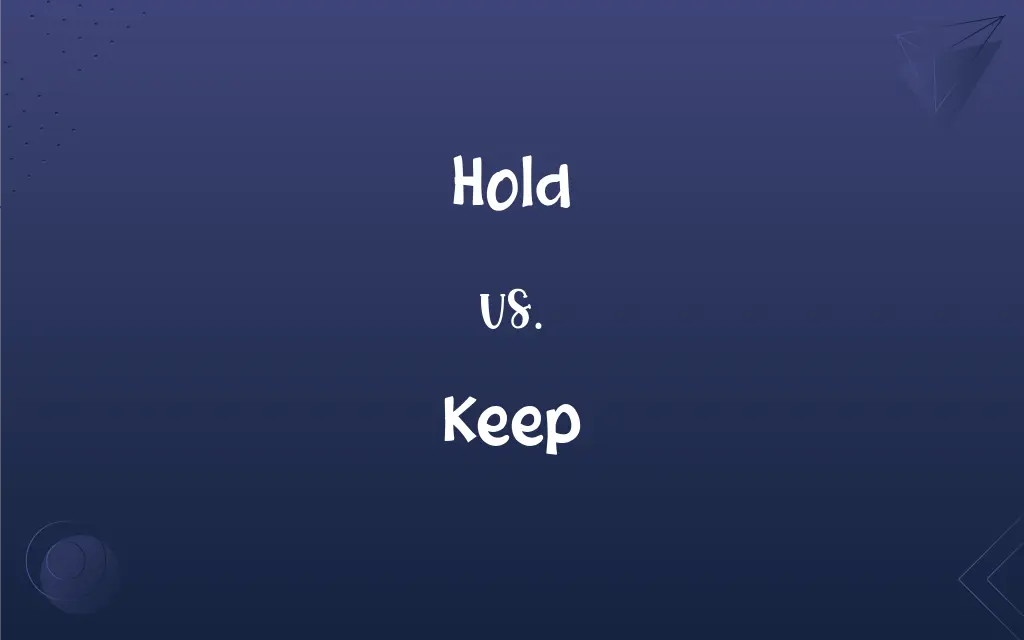Hold vs. Keep: What's the Difference?
Edited by Harlon Moss || By Janet White || Published on December 30, 2023
Hold refers to physically grasping or carrying something, while keep implies maintaining possession, condition, or position over time.

Key Differences
Hold often denotes a physical action of grasping or containing something. Keep, in contrast, suggests retaining possession or maintaining a condition over time.
To hold something can imply temporary or immediate control. Keep, however, implies a longer duration, often with a sense of preservation.
Holding can involve a physical touch or support. Keeping something can be physical or conceptual, like keeping a promise.
The act of holding is typically a present, active process. Keeping can be both an active effort or a passive state.
Holding something does not necessarily imply ownership. Keeping something often suggests a right or responsibility towards it.
ADVERTISEMENT
Comparison Chart
Primary Meaning
To grasp or carry physically
To retain or maintain over time
Duration
Often temporary or immediate
Usually long-term or ongoing
Physicality
Usually requires physical touch
Can be physical or conceptual
Nature of Action
Active, present process
Can be active or passive state
Implication of Ownership
Does not imply ownership
Suggests right or responsibility
ADVERTISEMENT
Hold and Keep Definitions
Hold
To support something or keep it in position.
The shelves are strong enough to hold heavy books.
Keep
To maintain something in a specific condition.
He keeps his car in excellent condition.
Hold
To maintain a course or direction.
The ship holds its course despite the storm.
Keep
To manage or look after something or someone.
They keep a small vegetable garden in their backyard.
Hold
To have and maintain possession of something.
He holds the record for the fastest mile.
Keep
To continue or persist in an action or state.
Keep walking until you reach the corner.
Hold
To grasp or carry something in one's hands or arms.
She holds the baby gently in her arms.
Keep
To adhere to or fulfill a promise or obligation.
She always keeps her promises.
Hold
To contain or be capable of containing something.
The tank can hold up to 50 gallons of water.
Keep
To retain possession of something.
She keeps her grandmother's ring in a safe place.
Hold
To have and keep in one's grasp
Held the reins tightly.
Keep
To retain possession of
Kept the change.
Must keep your composure.
Hold
To aim or direct; point
Held a hose on the fire.
Keep
To have as a supply
Keep spare parts in case of emergency.
FAQs
Does keep always mean physical possession?
No, keep can also refer to maintaining a condition or fulfilling a commitment.
Is hold used in a temporary context?
Yes, hold often implies a temporary action or situation.
Is holding something a physical action?
Generally, yes. Holding usually involves physically grasping or supporting.
Can hold imply a legal possession?
Hold can imply legal possession, as in holding a title.
Can keep imply a responsibility?
Yes, keep often implies a responsibility to care for or maintain something.
Can keep be used in the context of secrets?
Yes, keep can be used as in keeping a secret.
Does hold have a time implication?
Hold often implies a present or immediate time frame.
Can keep imply preservation?
Yes, keep can imply preservation, as in keeping something intact.
Can keep refer to a habit or practice?
Yes, keep can refer to a habit, as in "keep doing something."
Does keep have a connotation of continuity?
Yes, keep often implies continuity or consistency.
Is hold used in legal terms?
Yes, hold is used in legal terms like "hold liable."
Can hold refer to emotional states?
Yes, hold can refer to emotional states, like holding anger.
Can hold be used metaphorically?
Yes, hold can be used metaphorically, as in holding a belief.
Does keep suggest a level of control?
Yes, keep suggests a level of control or management over something.
Is hold used in expressions?
Yes, hold is used in various expressions like "hold on" or "hold back."
Does hold have a physical limitation?
Yes, hold is often limited by physical capacity.
Is hold used in nautical terms?
Yes, hold is used in nautical terms, like "hold course."
Is keep used in sports?
Yes, keep is used in sports, like "keep score" or "keep the lead."
Is keep used in technology?
Yes, keep is used in technology, like "keep your software updated."
Can keep be used in terms of relationships?
Yes, keep can be used in relationships, as in keeping in touch.
About Author
Written by
Janet WhiteJanet White has been an esteemed writer and blogger for Difference Wiki. Holding a Master's degree in Science and Medical Journalism from the prestigious Boston University, she has consistently demonstrated her expertise and passion for her field. When she's not immersed in her work, Janet relishes her time exercising, delving into a good book, and cherishing moments with friends and family.
Edited by
Harlon MossHarlon is a seasoned quality moderator and accomplished content writer for Difference Wiki. An alumnus of the prestigious University of California, he earned his degree in Computer Science. Leveraging his academic background, Harlon brings a meticulous and informed perspective to his work, ensuring content accuracy and excellence.






































































